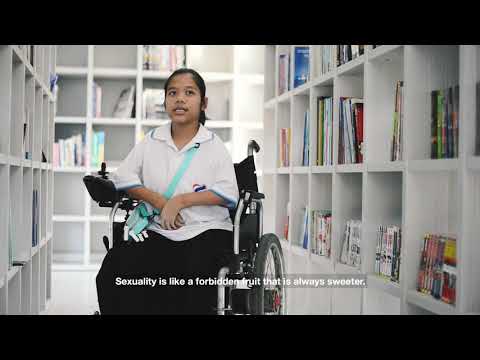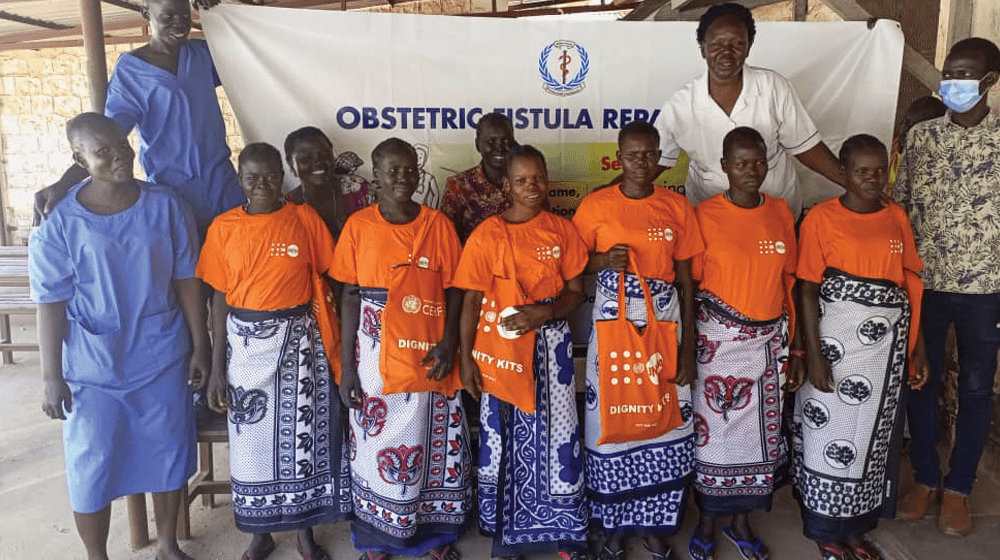Dr. Koma Akim, a general surgeon by profession was one of the outstanding trainee on Obstetric Fistula in 2022 at Juba Teaching Hospital. For Dr Koma his interest in Fistula repairs started in 2019 when he first came into direct contact with patients suffering from obstetric fistula in South Sudan.
“I was touched by the patients’ stories of despair, ostracization, and social stigmatization. I felt the need to help them the best way I could, and that is when I started learning how to perform obstetric fistula repairs” said Dr Koma Akim
It was obvious that even with his superior surgical skills, specialised training in obstetric fistula repairs was necessary. The in-country capacity-building initiative for the fistula surgical team in South Sudan was very timely.

Dr Koma commends UNFPA for starting to build local talents to spearhead obstetric fistula prevention, diagnosis, treatment, rehabilitation, and social reintegration.
“It is my hope and prayer that the trained team will continue to work and contribute to ensuring that South Sudan is "fistula free" in our lifetime. At a personal level I have advanced my career by attending the intermediate training for fistula repairs in Eldoret, Kenya. This was a build up to the basic skills and networking I got during my first training” Dr Koma adds.
He has since gone ahead to perform over 7 fistula repairs unsupervised and attended the International Society of Obstetric Fistula Surgeons (ISOFS) conference in 2022 with support from UNFPA. According to Dr Koma, the conference was an eye-opener and he appreciated the work and dedication of other experienced international fistula surgeons.
Building local capacity goes a long way to ensure continuity of care which is practically impossible with visiting consultant surgeons. Dr Koma says that even among those who undergo successful repairs, the condition is likely to recur in subsequent births because their spouses do not give them sufficient time to recover. Dr Koma recounts about a miracle impossible in one of the fistula campaigns.
“I remember this woman who had had five failed obstetric fistula repairs and was declared incurable! Yet she still came for screening and wanted another chance to undergo a fistula repair. Luckily, the repair was successful and returned to thank the medical team after 10 months. In her words she said you never gave up on me”. he narrates.
While he still cherished the dream of establishing a private obstetric fistula repair centre in future, Dr Koma is grateful to UNFPA for the fundamental role it has played in training healthcare workers especially midwives, nurses, associate clinicians and specialist doctors in EmONC to help reduce the maternal mortality rates, in addition to providing sexual and reproductive health and GBV services for the wellbeing of women and girls, for everyone to thrive in South Sudan.

The situation of Obstetric Fistula in South Sudan
The estimated prevalence of Obstetric Fistula (OF) among women of reproductive age is 3% in South Sudan as indicated in the National Obstetric Fistula Strategy. This is directly linked to high maternal mortality, particularly in those areas where prolonged obstructed labour and poor transport contributes to a high proportion of maternal deaths.
The Ministry of Health (MoH) estimates that at least 60,000 women are living with OF in South Sudan, of whom fewer than 1,000 have had surgical repair and treatment. Adolescent girls are particularly susceptible to obstructed labour because their pelvises are not fully developed. Unfortunately, South Sudan has a very high teenage-pregnancy rate, estimated at 300/1,000 and an adolescent birth rate of 158/1000. It is anticipated that the prevalence may be higher given the poor socioeconomic profile and healthcare system, a situation which has been worsened by the prolonged humanitarian crisis, climate change and impacts of epidemics including COVID-19.
The solution that Dr Koma was part of
Driven by the desire to increase access to obstetric fistula prevention, treatment, rehabilitation and social reintegration services, the MoH with support from UNFPA developed the National Obstetric Fistula Strategy (NOFS) 2019–2023 underpinned by the global, regional and national agenda towards ending preventable maternal deaths and obstetric fistula eradication.
Over the years MoH with the support from UNFPA and other partners conducted several obstetric fistula campaigns by foreign surgeons which successfully repaired over 300 women across the country at a cost of about 1000 USD per patient. In some instances, the entire fistula surgical teams were expatriates and therefore not sustainable. Such an observation created the desire to train nationals and equip health facility to be able to provide routine fistula repair services at health facilities sustainably.
In 2021, a surgical team was trained including 2 surgeons and 3 obstetricians supported by medical doctors, nurses, midwives, theatre attendants and anaesthetists and second batch successfully trained in 2022 at Juba Teaching Hospital with 3 gynaecologists as the main trainees. As part of the training 80 women underwent fistula repairs.
Read more about Fistula https://www.unfpa.org/obstetric-fistula


